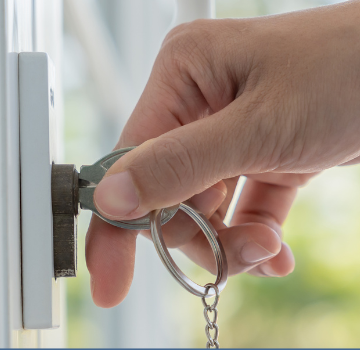
Homeowners Insurance Consumer Tips
The Ins and Outs of Homeowners Insurance

In light of Hurricane Helene’s disastrous impact on Western North Carolina and parts of East Tennessee last fall—the effects of which are ongoing as efforts to rebuild get underway—and now the impact of devastating California wildfires, homeowners insurance has been on the minds of many.
And so, as we launch into 2025, we are sharing a property owner–focused resource on that vital subject in this blog post, starting with the very basics. The following information is courtesy of the National Association of REALTORS® as part of its Consumer Guide series. These are broad principles, and the details may differ for properties here in Wilson, Smith, and Dekalb counties, so please keep in mind that it’s always best to work with a REALTOR® here in Eastern Middle Tennessee.
With that in mind: Understanding homeowners insurance is essential for anyone looking to purchase a home. Start looking at policies early—an agent who is a REALTOR® can help. Here’s what you need to know:
What is homeowners insurance? Homeowners insurance covers you for unexpected losses at your home or property. It can include provisions to repair or rebuild the property, replace assets within the home, cover accidents that happen to you or someone else on the property, or even pay for living expenses if a covered incident forces you to live elsewhere temporarily.
Is homeowners insurance required? If you are taking out a mortgage on your new home, your lender may require you to have a homeowners insurance policy for the duration of your mortgage. If your mortgage is paid off, or if you’ve paid for the home in cash, no laws require you to maintain insurance. However, having insurance is generally a good idea to ensure your assets are protected.
 How much does homeowners insurance cost, and how do I pay it? The cost of homeowners insurance depends on several factors, including your credit history (in some states), the house’s age, square footage, condition of the property, and location. You may have the option to pay your premium on a monthly, quarterly, or annual basis. Some lenders collect the insurance premium as part of your monthly mortgage payment, place it in an escrow account, and pay the insurer on your behalf.
How much does homeowners insurance cost, and how do I pay it? The cost of homeowners insurance depends on several factors, including your credit history (in some states), the house’s age, square footage, condition of the property, and location. You may have the option to pay your premium on a monthly, quarterly, or annual basis. Some lenders collect the insurance premium as part of your monthly mortgage payment, place it in an escrow account, and pay the insurer on your behalf.
What does my insurance cover? There are two types of coverage provided by a homeowners policy:
• “Named Peril” coverage pays only if the damage is caused by a specifically named peril. The most popular policy, HO-3, covers the home structure and personal belongings for disasters including fire, hail, lightning, freezing, theft, and vandalism.
• “Open Peril” coverage pays in all instances except for when the damage is caused by an incident that is specifically excluded. HO-5 insurance policies may offer more extensive, open peril coverage, but they often have higher premiums and more eligibility requirements.
How much will my insurer pay me? In the event of a loss, there are three types of reimbursement:
• Actual cash value: The insurer pays out the cost to fix the home and replace your personal belongings, minus any depreciation. For example, if you bought a new table 5 years ago for $1,500, but due to normal wear and tear, it’s only worth $750 at the time of the covered incident, then your insurer will only pay out up to $750.
• Replacement cost value: The insurer will reimburse the money needed to make repairs and/or purchase a comparable new model at today’s prices without taking depreciation into account. In this case, even if you only paid $1,500 for the table 5 years ago, if a comparable model is $2,500 today, then you may be paid $2,500 to replace the damaged furniture.
• Guaranteed or extended replacement cost: A guaranteed replacement policy means the insurer will pay the actual cost to replace a home at the time of loss, regardless of the policy limit. An extended replacement policy gives extra coverage above the policy limit up to a set percentage. For example, a home insured for $500,000 that takes $750,000 to rebuild would be completely covered with a guaranteed replacement policy. But an extended coverage policy at 20% would mean the insurer pays 120% ($600,000), or $100,000 above the limit.
Are homeowners insurance premiums tax deductible? If the property in question is your main home, then your home insurance is generally not deductible. However, people who run a business from their home or those intending to rent out their property may be able to claim a deduction. Additionally, if you suffered a loss to your property caused by a presidentially declared disaster, you may be able to claim a casualty loss deduction. Discuss your unique needs with a tax professional.
As we noted at the top of this post, practices may vary based on state and local law. If you are a property buyer, consult your real estate professional and/or an attorney for details about state law where you are purchasing a home. Please visit facts.realtor for more information and resources.
About EMTAR: Chartered in 1969, our Association’s 1,300+ REALTORS® are a proud part of the 36,000+ members of Tennessee REALTORS® and of the 1.5 million+ members of NAR, all working to serve the public and protect the rights of America’s property owners. EMTAR members are known not only for their unmatched real estate excellence and high ethical standards, but also for being generous, hospitable, others-focused, loyal, hardworking, and eager to help wherever and whenever help is needed.
